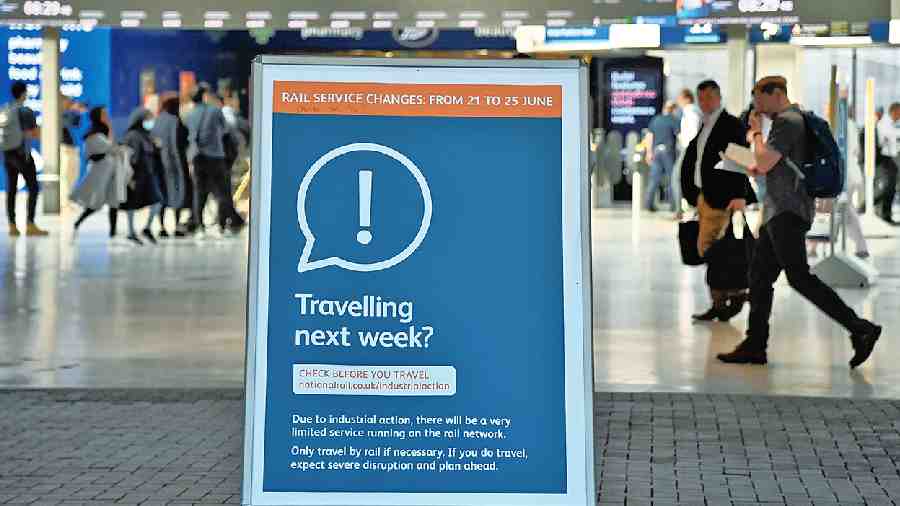What does it feel to be in a middle of a national rail strike, said to be the biggest in 30 years?
The exceptionally high number of Indians who have flooded into London for the season – friends from Calcutta keep meeting each other in the lift at the St James Court Taj Hotel in Buckingham Gate – are finding out.
June 21, which marks the Summer Solstice and is the longest day of the year, has turned out to be warm and sunny, like a pleasant winter’s afternoon in India.
Unfortunately it has also signalled the first day of the national rail strike. At some stations — Glasgow Central and Manchester Piccadilly, for example — reports said there were “for now, at least, more pigeons than people”. Euston in London was empty.
There is little or no service on the London Underground, which Indian holidaymakers use to do their shopping, or get to restaurants or shows in the evening.
There is an almost total shutdown of the network in England, Wales and Scotland, as members of the Rail, Maritime and Transport Workers union (RMT) stage the first of this week’s three 24-hour walkouts over pay and conditions.
The unions want a 7 per cent pay rise and a guarantee there will be no compulsory redundancies, while Network Rail, representing management, have offered 3 per cent and insist working practices need to be modernised. There is more than a suggestion that a majority of ticket offices will have to be closed.
There are about 40,000 RMT members who work on the railways in jobs such as maintaining tracks and signals, station staff and signallers. Because they are taking action, trains cannot run – even though most drivers, on £60,000 a year, are members of a different union, Aslef, who are currently not on strike.
To put pressure on the management and the government, there will be follow up strikes on Thursday June 23 and Saturday June 25.
There are also 10,000 RMT members in the London Underground who walked out on Tuesday. The action affected the brand new Elizabeth line which opened last month. Underground lines suspended included the Bakerloo, Central, Circle, District, Hammersmith & City, Jubilee, Metropolitan, Piccadilly, Victoria and Waterloo & City.
Indian holidaymakers in London can get taxis, to be sure, but by morning traffic was gridlocked. Patients could not keep critical hospital appointments.
There is also travel chaos at the airports. For weeks there has been upheaval, with thousands of passengers left stranded at Gatwick, Stansted and Manchester airports or abroad. Airlines, including EasyJet and British Airways, have been cancelling flights at short notice because of staff shortages, technical problems and other reasons.
The national rail strike has added to the sense that Britain is now in the middle of what feels like a prolonged summer of discontent which could destabilise the government.
On Tuesday, parents were worried about getting their children to school in time for important exams.
The father of an 18-year-old with his final A-Level exam on Thursday said his son has been “very anxious about how to get to school” for the test.
Johnny, 49, from the Westminster area of London, said he would drive his son the 25 miles to school instead, setting out at around 6am. “His exam starts at 9am and they have to be at school by 8.30 the latest. I have to start working at 10 so I will have to be late.”
The government argues giving in to pay demands from the public sector will make it impossible to control inflation, now set to go beyond 10 per cent. Food and fuel prices have also risen sharply because of the war in Ukraine.
The prime minister Boris Johnson described the rail strikes as “unnecessary aggravation” and urged rail passengers to “stay the course”.
He warned: “If we don’t do this, these great companies, this great industry, will face further financial pressure, it will go bust and the result will be they have to hike up the cost of tickets still further.”
The RMT reckons the whole dispute has been “manufactured” by the transport secretary Grant Shapps. The latter claims the conflict has been “created by the unions”.
RMT general secretary Mick Lynch accused Shapps of “spouting nonsense” with plans to allow agency staff to replace striking workers.
He said: “Well, I don’t know how bringing in untrained, inexperienced workers into a dangerous environment like the railway with high-speed trains – there are high voltage distribution systems – will help anyone, whether they are a passenger or a worker or manager.”
Some Labour MPs defied their leader Keir Starmer and joined striking workers on the picket line to intensify pressure on the government.










